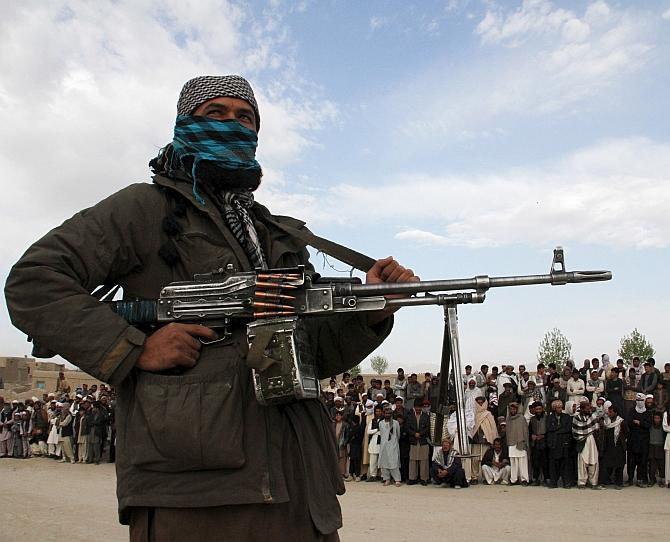Pakistan has worsted India in the Afghan proxy war and the defeat becomes a template of regional politics, points out Ambassador M K Bhadrakumar.

The Four-Party Meeting on the Afghan Peace Process, held in Beijing last Thursday and Friday, comprising China, the US, Russia and Pakistan, is a dramatic development auguring a peace settlement in Afghanistan.
In a regional setting, it also signifies that Pakistan has inflicted a heavy defeat on India in the decade-old proxy war in Afghanistan.
The special envoys of the four countries who met in Beijing have issued a joint statement (external link) underscoring their consensus on peacemaking in Afghanistan and signalling their intention to speed up the peace process to a final settlement.
The salients of the joint statement are: First and foremost, the trilateral US-Russia-China format on Afghanistan has been expanded to include Pakistan, given the shared belief of the three big powers that 'Pakistan can play an important role in facilitating peace in Afghanistan'.
Second, the four countries have endorsed the intra-Afghan meetings in Moscow and Doha in the recent months and called on relevant parties to 'immediately start intra-Afghan negotiations between the Taliban, Afghan government, and other Afghans' with a view to 'produce a peace framework as soon as possible'.
Third, they have urged that the peace framework should 'guarantee the orderly and responsible transition of the security situation and detail an agreement on a future inclusive political arrangement acceptable to all Afghans'.
Four, the joint statement encourages the Afghan parties to scale down violence 'leading to a comprehensive and permanent ceasefire that starts with intra-Afghan negotiations'.
Finally, the four countries have resolved to maintain the momentum of their consultation and 'will invite other important stakeholders to join on the basis of the trilateral consensus agreed on April 25, 2019 in Moscow, and this broader group will meet when intra-Afghan negotiations start'.
All in all, the Four-Party format will henceforth chariot the Afghan peace process -- monitoring its progress, mentoring the Afghan protagonists, fine-tuning the intra-Afghan negotiations and so on.
In an upbeat note, the US Special Representative Zalmay Khalilzad tweeted from Beijing on Friday that the four countries agreed that 'intra-Afghan negotiations between the Taliban, the Afghan government, and other Afghans should start immediately; that these negotiations should produce a peace framework as soon as possible; and detail a future inclusive political arrangement acceptable to all Afghans'.
'We also agreed that violence needs to slow now and a comprehensive and permanent ceasefire should start with intra-Afghan negotiations. We agreed we will expand and ask more international partners to join with the start of negotiations. Very positive', Khalilzad added.
In sum, the US, Russia and China who are tiptoeing toward a new Cold War, seem to set aside their differences and disputes and seek and end to the Afghan war.
Curiously enough, the Pentagon's recent Indo-Pacific Strategy Report (released in June) called China a 'revisionist power' and Russia a 'revitalised malign actor', but last weekend, all three were tangoing in Beijing like nobody's business.
Indeed, this is how the 'great game' was always played in Central Asia -- intense rivalries interspersed with interludes when rival powers retired to the shade, nursed their injuries and brooded over next moves on the shifting landscape.
It is hard to believe that post-war Afghanistan will witness the end of history.
For the present, the game stands suspended.
However, when China's shadows lengthen over the Hindu Kush and Afghanistan transforms as a hub of the Belt and Road Initiative, which is inexorable, the great game will resume.
As the US vacates its occupation, China becomes the dominant presence in the Hindu Kush.
The US would have no prospects of regaining its lost hegemony in Afghanistan for a foreseeable future -- perhaps, never.
The Four-Party format crystallises Pakistan's crucial role as a factor of Afghan security and stability.
This works in China's favour and, paradoxically, makes Pakistan an indispensable partner for the US (and Russia) as well.
Washington and its Western allies have no option but to depend on Pakistan to ensure that Afghanistan will not become a 'lab of terrorists' (to borrow President Trump's words.)
Pakistan's relations with China will acquire a new verve as the BRI spreads its wings in Afghanistan.
The growing Russian interest in the CPEC will take concrete form.
A revival of Pakistan's moribund strategic ties with the US is already under way.
Without doubt, India is the big loser.
Pakistan has worsted India in the Afghan proxy war and the defeat becomes a template of regional politics.
The Indian analysts put the blame on the US, arguing that Washington ditched India after leading it up the garden path.
Indeed, President Trump once hailed the Modi government as the US's number one partner in its South Asian strategy.
But does the fault lie with the US?
From the American viewpoint, Afghanistan has become a 'bleeding wound'(as Gorbachev described the Soviet defeat in Afghanistan), causing a big drain in resources.
In the final analysis, the Indian policymakers failed to read the tea leaves correctly when it became apparent that the so-called Afghan surge under General David H Petraeus ended inconclusively by September 2012, with no fanfare at the Pentagon and no proclamation of success from the Obama White House.
Fundamentally, the Indian policy failure lies in turning Afghanistan into a turf to wage a proxy war against Pakistan.
In the zero-sum mindset, Delhi overlooked that Pakistan has legitimate interests in Afghanistan -- no less than what India would have in, say, Nepal -- and that by virtue of culture, tribal and ethnic affinity or sheer geography and economic and social compulsions, Afghans can never do without Pakistan.
Delhi regarded the Taliban as a progeny of the Pakistani intelligence and military, but that was never the whole story of the Afghan insurgency and resistance.
Delhi was impervious to other ground realities too -- such as that Kabul government was lacking legitimacy, that massive corruption was undermining the State; and, importantly, that this was an unwinnable war and a reconciliation with the Taliban was the only way out.
A long haul lies ahead for India now to regain the lost influence in Kabul.
Meanwhile, India will have to reconcile with the geopolitical reality that Afghanistan comes under the Chinese orbit for the first time in the history of our region.
But the spectre that is haunting Delhi is the strong likelihood of a Taliban takeover in Afghanistan and of a Sharia State emerging in India's neighbourhood.
How come Indian diplomacy failed to stop this happening?
The short answer is that the obsessive focus on the proxy war meant that India missed the wood for the trees.
The intelligence and security establishment was on the driving seat and there was no sustained effort to network at the diplomatic level with like-minded countries, especially Iran and Russia, or to mobilise international opinion against a Taliban takeover in Afghanistan.
This policy failure will have serious consequences.
Once the US withdrawal is over, India has to deal with a triumphalist Pakistan that gains immense strategic depth vis-a-vis India.
Meanwhile, the big powers are busy securing their specific interests with Pakistani help and cooperation, which leaves India out in the lurch.
The latest al-Qaeda call for 'jihad' in India needs to be taken seriously.
But India has cried 'wolf' so often that no one may take it seriously when the wolf finally arrives at the doorstep.
A close analysis of the Doha Agreement following the so-called intra-Afghan talks on July 7-8 shows disturbing signs that the Taliban may have 'marched closer to their stated objectives of enforcing Islamic shari'a rule in Afghanistan and of restructuring the Afghan government institutions, including the military, to their liking'.
This is the expert assessment of the Middle East Media Research Institute headquartered in Washington, after studying the three different versions (external link) of the Doha Agreement and the Taliban's own version.











 © 2025 Rediff.com -
© 2025 Rediff.com -